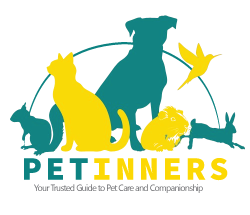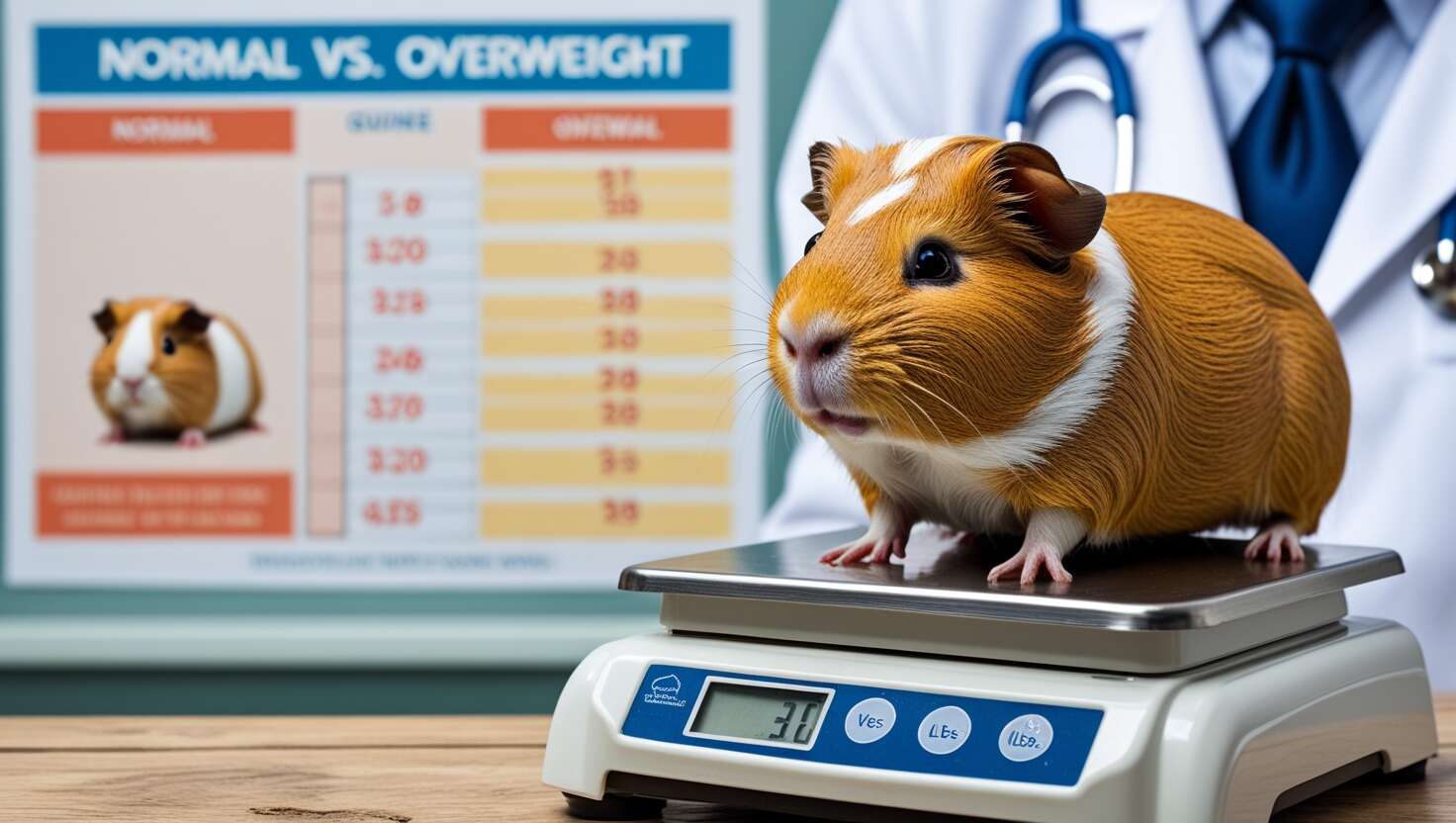A Guide to Managing Your Guinea Pig’s Weight
Maintaining a healthy weight is crucial for your guinea pig’s well-being. Monitor their size with regular weigh-ins, provide a balanced diet rich in hay, and encourage exercise through a spacious setup and interactive play. Avoid overfeeding high-calorie treats and consult a vet for guidance on weight management. A well-balanced routine ensures a happy, active, and healthy guinea pig!
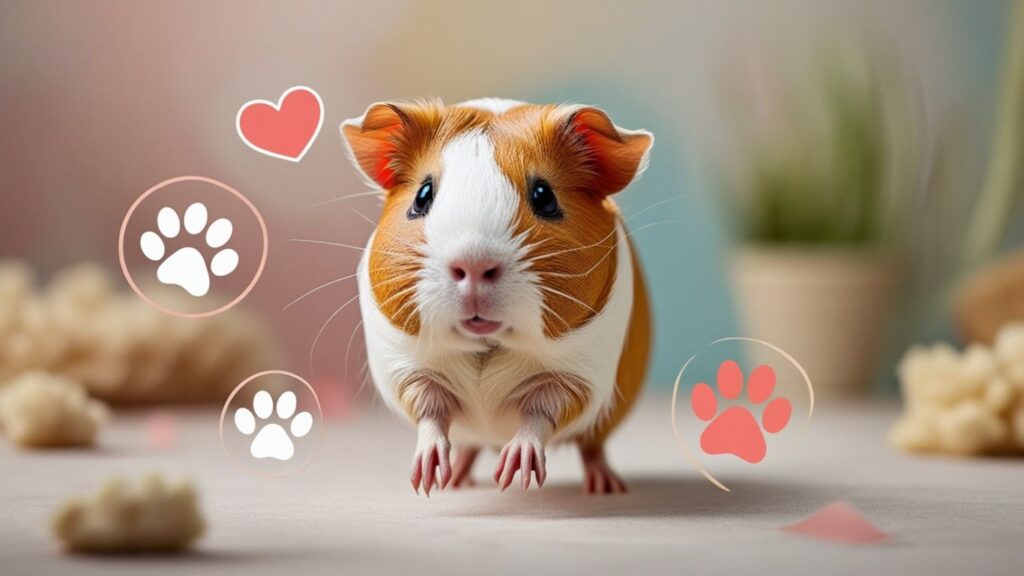
Importance of Maintaining a Healthy Weight
Keeping your guinea pig at a healthy weight is essential for their overall health and well-being. As prey animals, guinea pigs tend to hide signs of illness, making regular weight monitoring crucial. A balanced diet, a large habitat, and consistent exercise help prevent obesity, which affects their body shape. It’s tempting to spoil them with extra food or sensible treats, but moderation is key. If your fat guinea pig starts to look like a rounded brick, it may be time for a check-up with your vet team. Veterinary professionals, such as Alpha Veterinary Surgery, can provide guidance on managing weight-related concerns and ensuring your piggy stays happy and active.
Signs Your Guinea Pig May Be Overweight
- Less Wheeking Calls: A decrease in vocal activity may indicate discomfort.
- Reduced Interest in Toys: A lack of enthusiasm for playtime.
- Physical Changes: Changes in their nose and eyes, puffiness, or bulging abdomen.
- Difficulty Moving: Struggles with walking or shifting positions.
If you notice these signs, don’t delay an appointment with the vet. Owners must learn how to properly treat their piggies by following a comprehensive guide like this. Small changes in their food choices and exercise areas can make a big difference. Keeping them active will prevent them from getting too heavy, ensuring they stay in good shape year-round.
How to Determine If Your Guinea Pig Is Overweight
If your guinea pig looks rounder than usual, it may be a sign of excess weight. A quick way to check is by feeling their sides—if their ribs are hard to detect, they might be overweight. Using a guinea pig body chart can help compare their fitness level to a healthy size. If you’re unsure, a vet visit can provide expert advice on diet and exercise.
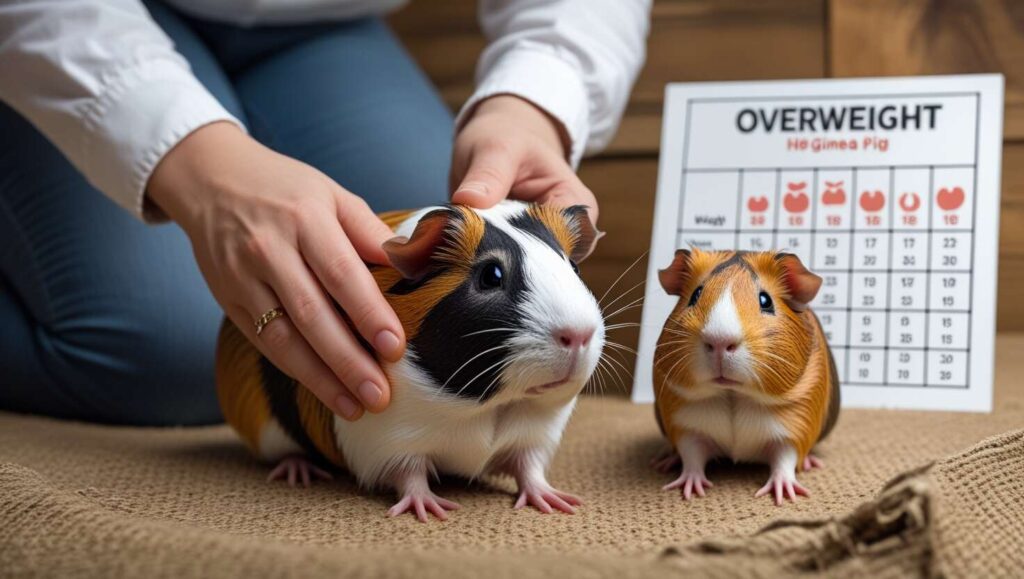
Making small adjustments can help them shed extra grams. Reducing pellets, increasing floor time, and offering a balanced diet will make a big difference. If your guinea pig struggles to move or looks uncomfortable, don’t wait—seek professional guidance to prevent future health issues.
Key Signs of Weight Issues in Guinea Pigs:
- Visual Check: If your guinea pig appears rounder than usual, this might indicate excess weight.
- Feel Their Sides: You should be able to feel their ribs easily. If not, they may be overweight.
- Use a Guinea Pig Body Chart: Comparing your pet’s physique to a fitness level chart can help evaluate their condition.
- Monitor Their Mobility: Some guinea pigs may struggle to move excess weight, leading to further health problems.
- Vet Consultation: If unsure, a vet visit can provide tailored advice on diet and exercise.
- Make Small Changes: Reduce pellets, provide more floor time, and adjust food portions gradually.
By staying observant and making simple changes, you can help your guinea pig maintain a healthy weight and prevent future health issues! 🐹✨
Risks of Obesity in Guinea Pigs
Excess weight can lead to several health complications, including:
- Increased risk of heart disease, bladder infections, high blood pressure, and joint pain.
- A shorter lifespan due to strain on vital organs.
- Reduced mobility, making it harder for them to run, jump, or explore.
- Lower energy levels, leading to inactivity.
- Difficulty in self-cleaning, increasing hygiene issues, and risks like flystrike.
Maintaining a healthy diet and ensuring regular exercise can help keep your guinea pig in great shape.
Reasons for Weight Gain in Guinea Pigs
Weight gain in guinea pigs can be a BIG problem, and owners should watch for signs that their small furry pets are getting too heavy. Excess weight can result from lack of exercise, too much food, or even a medical condition. In some cases, bloat or an abdomen that appears swollen may indicate a serious issue, like a tumor, distension, or even pregnancy. It’s essential to have your pet checked out by a vet to rule out health problems.
Overfeeding
- Guinea pigs have small stomachs and cannot process large amounts of food at once.
- Overfeeding can lead to bloating and rapid weight gain.
- A balanced diet should include:
- Hay is the main food source.
- A small amount of pellets for nutrients.
- Fresh fruits or vegetables in controlled portions.
- Over-relying on nuggets or high-calorie treats can contribute to weight gain.
- Guinea pigs do not efficiently burn excess calories, making portion control important.
- Providing healthy food options alongside freshwater supports their well-being.
- Limiting treats and maintaining a nutritious diet keeps them active and fit. 🐹✨
Lack of Exercise
- Guinea pigs are active animals and require plenty of movement to stay healthy and fit.
- Lack of exercise can lead to rapid weight gain and increase the risk of health issues.
- A large enclosure with tunnels, hideaways, and accessories encourages them to stay active and engaged.
- A sedentary lifestyle without enough space or opportunities to move can negatively impact their well-being.
- Ensuring daily playtime and access to a stimulating environment keeps them happy and energetic. 🐹✨
Health Issues
- Sudden weight gain in guinea pigs may indicate an underlying health issue.
- It’s important to rule out medical problems before adjusting their diet or exercise routine.
- Hormonal imbalances or digestive issues can affect their ability to process food efficiently, even if they are not overfed.
- A vet check-up can help identify potential health concerns and provide the right treatment.
- Regular health monitoring ensures your guinea pig stays happy and healthy. 🐹✨
Aging
- Older guinea pigs naturally experience a decrease in exercise and activity levels.
- A slower metabolism makes them more prone to weight gain.
- They require a balanced diet with careful portion control to maintain a healthy weight.
- Owners should encourage movement by providing a stimulating environment with tunnels and play areas.
- Keeping their diet consistent helps support overall health as they age. 🐹✨
How to Help Your Guinea Pig Lose Weight
Keeping your guinea pig’s weight in check is essential for their overall health and well-being. A veterinarian can assess their condition and create a tailored weight loss plan if needed. A balanced diet is crucial, and choosing high-quality pelleted food rich in vitamin C helps support their nutritional needs. Avoiding excess treats and focusing on healthier alternatives can prevent gastrointestinal issues. If your guinea pig suddenly stops eating, seek immediate veterinary attention to prevent serious complications.
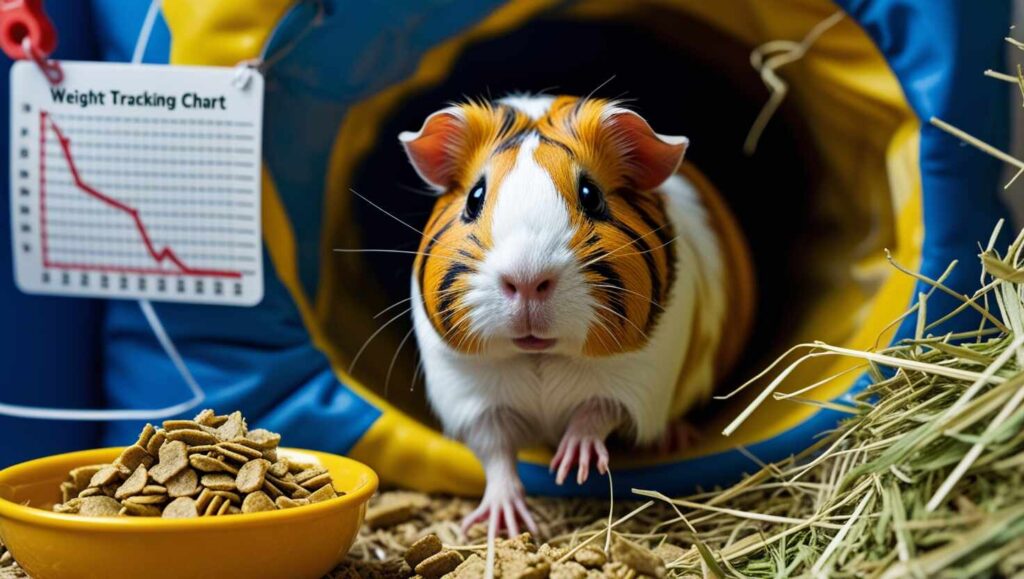
Encouraging mental and physical stimulation is also key to weight management. Rotating toys and interactive games keep them active and engaged, reducing boredom. Using scatter feeding and foraging trays can make mealtime more stimulating while promoting natural foraging behaviors. Regular weight checks help track progress and identify any concerns early on.
Key Tips for Managing Guinea Pig Weight:
Adjust Their Diet
- Provide high-quality pelleted food rich in vitamin C in limited quantities.
- Increase fiber intake while reducing high-calorie treats.
- Ensure unlimited access to fresh hay to promote digestion and prevent excessive weight gain.
Increase Exercise
- Allow for daily free-roam time in a safe, enclosed area.
- Introduce tunnels, ramps, and hideouts to encourage movement.
- Consider adopting another guinea pig for companionship and increased activity.
Monitor Weight Regularly
- Weigh your guinea pig weekly using a pet scale.
- Keep a record of their weight trends and consult a vet if necessary.
By balancing diet, activity, and routine, you can help your guinea pig maintain a healthy weight and enjoy a happy, active lifestyle! 🐹✨
Hay And Guinea Pigs: Providing fresh hay daily is essential for a guinea pig’s health, as it keeps their digestive system running smoothly and helps wear down their ever-growing teeth. The best option is grass hay, which is high in fiber and helps maintain a healthy weight by preventing excess calorie intake. Without enough hay, guinea pigs may become less active, leading to weight gain and other health issues.
Keeping hay available in their enclosure encourages natural foraging behavior, boosts confidence, and ensures they receive enough nutrients. While alfalfa hay is more nutrient-dense, it should only be given to pregnant or sick guinea pigs, as it is too rich for healthy adults.
Best Hay Practices for Guinea Pigs:
- Free-feed hay daily to ensure they get enough fiber.
- Grass hay is the best option for a balanced diet.
- Alfalfa hay should only be given to pregnant or sick guinea pigs.
- Hay supports exercise by encouraging movement and natural eating habits.
- Proper hay intake prevents overgrown teeth and promotes digestive health.
By making fresh hay a daily priority, you can keep your guinea pig active, healthy, and happy! 🐹✨
Proper Guinea Pig Nutrition: Providing a balanced diet is essential for a healthy and happy guinea pig. Their meals should include safe vegetables, fruits, and vitamin C-fortified foods to support their nutritional needs. Since guinea pigs cannot produce vitamin C on their own, their diet must include pelleted food, fresh produce, and hay to maintain good digestion and overall health. However, some foods can be harmful, and owners should always research safe options before feeding their pets.
Safe Foods for Guinea Pigs:
- Leafy greens (romaine lettuce, kale, cilantro).
- Bell peppers (great source of vitamin C).
- Cucumbers (hydrating and refreshing).
- Occasional fruits (small portions of apples, strawberries, and blueberries).
Foods to Avoid:
- Grapes and avocados (toxic to guinea pigs).
- Junk food (chips, fast food, fried items not suitable for their digestive system).
- Processed foods (cookies, cake, candy, potato chips, cheese curls, doughnuts).
- High-sugar and high-fat snacks that can cause digestion and weight issues.
- Foods high in calcium or oxalic acid (like spinach, should be given in moderation).
- Ice cream and dairy products (not suitable for their digestive system).
- Salty and artificial foods that guinea pigs cannot process.
- Avoid simple, high-fat options—stick to natural, unprocessed foods.
- Always provide a balanced diet and avoid anything not meant for their sensitive system. 🐹❌
Vitamin C for Guinea Pigs:
- Essential for their health since they cannot produce it naturally.
- Provide vitamin C-fortified pellets for daily nutrition.
- Fresh vegetables like bell peppers help meet vitamin C needs.
If a guinea pig eats something harmful, it can make them very sick. Always research safe foods and consult reliable sources like the ASPCA or Animal Poison Control Center if unsure. Proper nutrition is key to ensuring your guinea pig stays healthy and active! 🐹✨
Guinea Pig Treats: Guinea pig treats can be a great bonding tool, but they must be chosen wisely. Instead of commercial treats loaded with unhealthy ingredients, opt for natural options like small portions of fruit, vegetables, or hay. These provide nutritional benefits without causing weight gain. Treats should be hand-fed in moderation to ensure they don’t replace their regular diet.
If your guinea pig refuses a new treat, try offering a different healthy option that aligns with their nutritional needs. High-fiber foods like pellets are always a better choice than sugary snacks.
Best Treat Choices for Guinea Pigs:
- Tiny portions of fresh fruit (strawberries, apples, blueberries).
- Leafy greens (kale, parsley, cilantro).
- Hay-based treats to support digestion.
- Limited pellets as a high-fiber alternative.
Treats to Avoid:
- Commercial pet store treats with artificial additives.
- Sugary snacks that contribute to weight gain.
- Overfeeding treats that fill up their stomach and replace their main diet.
By selecting the right treats and offering them in small amounts, you can keep your guinea pig healthy while making bonding time more enjoyable! 🐹✨
Beyond Food: Managing a guinea pig’s weight goes beyond just diet—their habitat and activity level play a crucial role in maintaining a healthy balance. Allowing them daily out-of-cage time in a safe, enclosed area helps them burn energy and stay fit. Using an X-pen setup lets them move freely, preventing unnecessary weight gain.
To keep exercise engaging, introduce tunnels and hidden treats to encourage natural foraging behaviors. A supervised and stimulating environment not only keeps them active but also ensures they stay mentally engaged, making weight management easier and more natural.
Ways to Keep Your Guinea Pig Active:
- Provide daily out-of-cage time in a secure play area.
- Use an X-pen setup to encourage free movement.
- Add tunnels and obstacles to make playtime more exciting.
- Hide treats around the play area to promote natural foraging behaviors.
- Create a supervised environment that keeps them engaged and moving.
By ensuring ample movement and mental stimulation, you can help your guinea pig stay fit and maintain a healthy weight! 🐹✨
Reasons for Weight Loss in Guinea Pigs
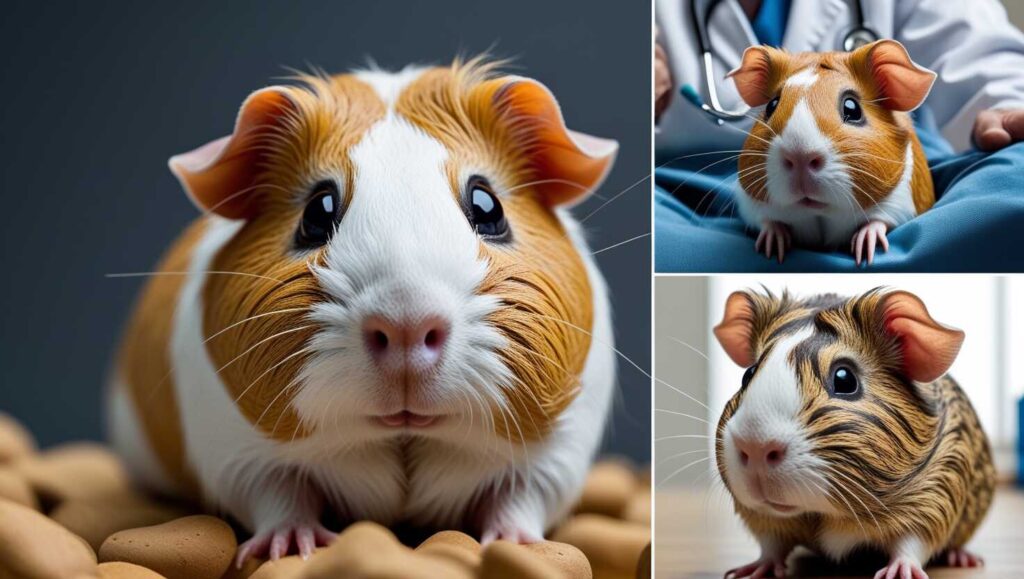
Illness
If your guinea pig starts losing weight suddenly, it could be a sign of an underlying illness. Health issues such as respiratory infections, digestive problems, and dental issues can affect their eating habits and overall well-being. If your guinea pig seems lethargic, refuses to eat, or shows other signs of illness, a vet visit is crucial. Early diagnosis and treatment can prevent further complications and help them recover faster.
Common Health Issues That Cause Weight Loss:
- Respiratory Infections: Breathing difficulties, nasal discharge, or wheezing may indicate a respiratory problem affecting appetite.
- Digestive Problems: Issues like bloating, diarrhea, or constipation can prevent proper nutrient absorption.
- Dental Issues: Overgrown teeth or mouth pain can make it hard for guinea pigs to chew food.
- Sudden Weight Loss: If your guinea pig is losing weight quickly, consult a vet immediately for proper diagnosis.
- Early Intervention Matters: Identifying the issue early can prevent serious health risks and improve their quality of life.
Keeping a close eye on their eating habits and behavior ensures they stay healthy and happy! 🐹✨
Stress
Guinea pigs are sensitive animals, and sudden changes in their environment or routine can cause stress, leading to loss of appetite and weight loss. Providing a calm and quiet space helps them feel secure and reduces anxiety. Keeping their environment consistent and avoiding sudden changes in diet or surroundings ensures they remain comfortable and stress-free.
Ways to Reduce Stress in Guinea Pigs:
- Maintain a stable environment with minimal changes.
- Avoid sudden diet changes, as it can disrupt their eating habits.
- Provide a quiet space away from loud noises and disturbances.
- Keep handling gentle and consistent to help them feel safe.
- Ensure they have hiding spots where they can retreat when feeling overwhelmed.
By creating a peaceful and predictable routine, you can help your guinea pig feel secure, preventing stress-related weight loss and keeping them healthy and happy! 🐹✨
Aging
As guinea pigs get older, their appetite may decrease naturally, which can lead to weight loss. Providing a consistent and balanced diet helps maintain their health and strength. Some older guinea pigs may require softer foods or extra nutrients to support their aging bodies. Keeping track of their food intake and ensuring they remain active can prevent sudden weight loss and promote overall well-being.
How to Support an Aging Guinea Pig’s Diet:
- Offer softer foods if they struggle to chew.
- Ensure a nutrient-rich diet to maintain strength.
- Monitor their food intake to detect early signs of weight loss.
- Encourage gentle activity to keep them engaged.
- Avoid sudden dietary changes that may cause discomfort.
By making small adjustments and providing proper care, you can help your senior guinea pig stay healthy and happy throughout their golden years! 🐹✨
Pregnancy
During pregnancy, a guinea pig’s body undergoes significant changes, requiring a nutrient-rich diet to support both the mother and her babies. While pregnant sows need extra food and care, some may appear to lose weight due to the high energy demands of pregnancy. After birth, nursing mothers require additional nutrition to recover and produce enough milk for their young. Regular monitoring of their weight and health is crucial to ensure a safe and smooth pregnancy.
Essential Care Tips for Pregnant Guinea Pigs:
- Provide a balanced, nutrient-rich diet to support both the mother and babies.
- Monitor their weight regularly to detect any concerning changes.
- Ensure extra nutrition for nursing mothers to help them recover and feed their young.
- Avoid unnecessary stress by keeping their environment calm and quiet.
- Consult a vet if you notice excessive weight loss or unusual behavior.
With proper food, care, and monitoring, you can help ensure a healthy pregnancy and a smooth recovery for your guinea pig mother! 🐹✨
How To Recognize When A Guinea Pig Is Underweight Or Overweight
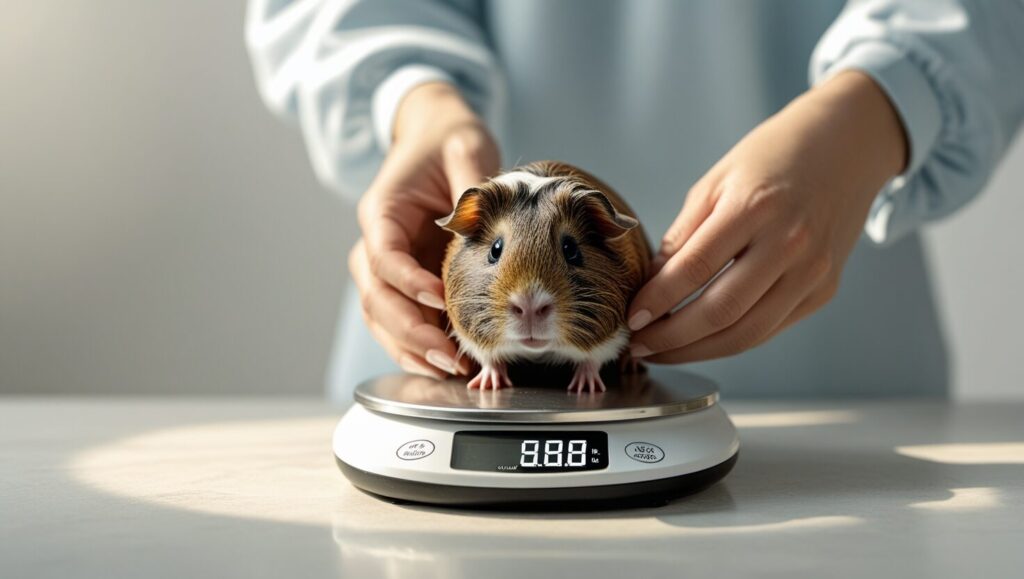
Use a Weight Chart
Keeping track of your guinea pig’s weight is important to ensure they stay healthy. A weight chart is a great tool to compare your pet’s weight with the recommended range based on their ages and different sizes.
These weight charts are available online and provide useful guidelines to help you monitor whether your guinea pig is within a healthy weight range. Regular tracking allows you to notice changes early and take action if needed.
Look at Their Appearance
A healthy guinea pig should have a smooth body with a visible waistline when viewed from above and a well-proportioned ribcage when viewed from the side. If your guinea pig appears too thin, with the spine and ribs easily felt, they may need more food.
On the other hand, if their abdomen starts to hang down and they have a rounded shape, they might be too heavy. An overweight guinea pig can experience difficulty moving, so checking their size using tools like the Pig-Size-O-Meter or referring to the Pet Food Manufacturers Association (PFMA) infographic can help owners assess their pet’s weight.
Consult with a Veterinarian
If your guinea pig seems like a pudgy piggie or isn’t at a healthy weight, it’s best to consult with a veterinarian. A vet can help track progress, create a meal plan, and suggest the right balance of veggies, fresh fruits, and pellets while avoiding sugary snacks. Regular weigh-ins can rule out any health hiccups and ensure they stay at their ideal weight.
A roomy cage, fun play dates, and plenty of crunchy veggies during the veggie-fueled exploration can help keep your pet happy and active. If needed, the vet may suggest ways to dial back treats and focus on a better diet for their overall health. Don’t forget, a little extra snuggles and attention can also make a big difference!
Weighing Your Guinea Pig: When and How
Tracking your guinea pig’s weight is essential for monitoring their health. A weekly weigh-in helps detect sudden weight changes, ensuring they remain healthy. Use a small kitchen scale or a pet scale and place your guinea pig on a stable surface for an accurate reading. If they are restless, placing them in a carrier or on a towel can help—just remember to subtract the towel’s weight for a precise measurement.
Recording their weight consistently helps maintain a care routine. Since some guinea pigs resist sitting still, offering a small treat or their favorite veggie can keep them calm. Regular weigh-ins help you track changes based on their life stage, allowing early detection of health concerns.
Key Tips for Weighing Your Guinea Pig:
- Weigh them once a week to monitor their health.
- Use a small kitchen scale or pet scale for accurate results.
- Ensure they sit on a stable surface for proper measurement.
- Use a towel or carrier if they are fidgety (subtract the towel’s weight).
- Keep a record of their weight to track long-term changes.
- Offer a treat or veggie to help them stay still during weigh-ins.
By following these steps, you can easily monitor their weight and ensure they stay healthy! 🐹✨
What Should a Guinea Pig Weigh?
Healthy Weight Ranges for Guinea Pigs
A guinea pig’s weight varies depending on its age, breed, and size. Younger guinea pigs under six months are still growing, while adult guinea pigs typically fall within a specific weight range. Some larger breeds, such as Peruvian guinea pigs, tend to weigh more due to their size and long fur, whereas Abyssinian and other medium-sized breeds may have slightly lower weight averages. If a guinea pig weighs under 600 grams, it could indicate health concerns, while those exceeding the typical range might have higher metabolism or dietary imbalances.
General Weight Guidelines for Adult Guinea Pigs:
- Smaller breeds – typically weigh under 600 grams.
- Medium-sized guinea pigs – range from 600 to 900 grams.
- Larger breeds – usually weigh between 900 and 1200 grams.
Monitoring your guinea pig’s weight regularly helps ensure they stay within a healthy range and allows for early detection of potential health issues. 🐹✨
Understanding Weight Fluctuations in Guinea Pigs
Guinea pigs may experience minor weight changes, but fluctuations between 25 to 50 grams are generally not a cause for concern. However, if your guinea pig loses 75 grams or more, it’s essential to monitor them closely and seek veterinary advice. Rapid weight loss or sudden weight gain may signal an underlying health issue that needs immediate attention.
When to Be Concerned About Weight Changes:
- Small changes (25-50g) – Normal fluctuations, no need to worry.
- Significant weight loss (75g or more) – Monitor closely and consult a vet.
- Rapid weight gain – This could indicate a health or dietary issue.
- Daily weigh-ins for adults – Necessary if weight irregularities are noticed.
- Consistent weight changes – Always seek vet advice if fluctuations persist.
Maintaining a stable weight is crucial for your guinea pig’s overall health, so regular monitoring helps ensure they stay happy and healthy! 🐹✨
My Guinea Pig Is Underweight, What Should I Do?
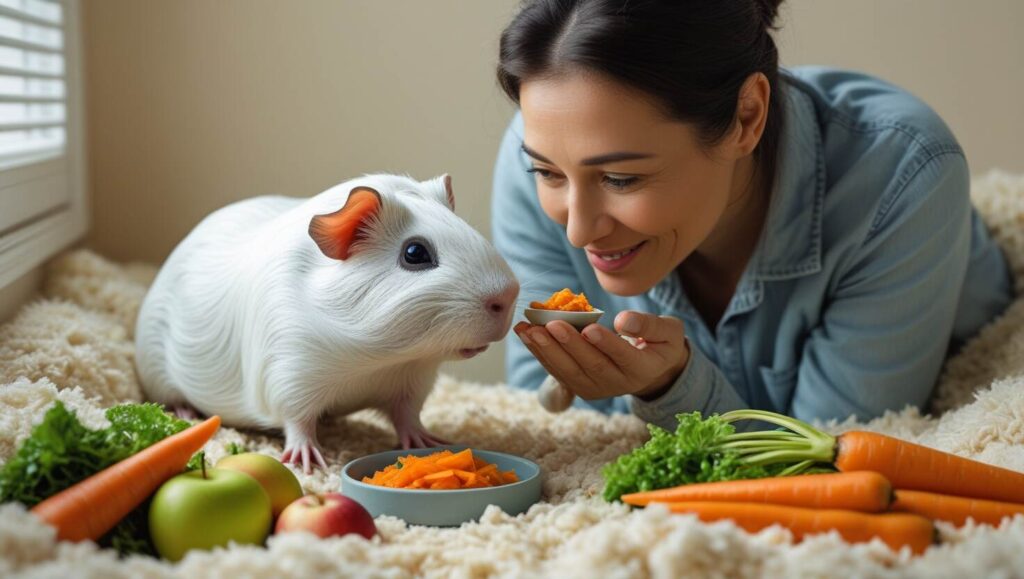
Helping an Underweight Guinea Pig
If your guinea pig is underweight, the first step is to check for underlying health issues. Keeping them in a comfortable temperature between 17°C and 20°C (60°F – 68°F) helps prevent stress-related weight loss. A nutritious diet should be introduced gradually, ensuring they receive the right food portions to regain weight. If your guinea pig refuses to eat, syringe feeding under veterinary guidance may be necessary to support their recovery. Providing a warm, quiet, and stress-free environment will also aid digestion and overall health.
Ways to Help Your Guinea Pig Gain Weight:
- Offer high-energy foods such as oat flakes and banana slices.
- Include supplement treats that are safe and beneficial.
- Ensure they are eating properly—if not, consider syringe feeding with vet advice.
- Monitor for signs of illness or injury and seek veterinary help if needed.
- Keep their habitat warm and stress-free to promote better digestion.
- Follow vet recommendations for feeding techniques and necessary treatments.
By providing proper nutrition, care, and veterinary support, you can help your guinea pig regain a healthy weight and maintain overall well-being! 🐹✨
Tips to avoid your Guinea Pig becoming underweight
Keeping your guinea pig at a healthy weight requires a balanced diet, proper care, and regular monitoring. A comfortable living space with adequate exercise ensures they stay active and maintain their weight. Offering high-quality pellets, fresh hay, and a variety of fruits and vegetables in appropriate portions will help meet their nutritional needs.
Ways to Prevent Weight Loss in Guinea Pigs:
- Provide a balanced diet with pellets, hay, and fresh produce.
- Monitor food intake—if appetite changes, adjust meal portions.
- Encourage eating with small healthy treats, but avoid overfeeding.
- Ensure clean food and water at all times to prevent health issues.
- Track weight regularly and make dietary changes when necessary.
- Maintain a comfortable, stress-free habitat to support digestion and overall well-being.
By following these simple tips, you can help your guinea pig stay healthy, active, and at an ideal weight! 🐹✨
My Guinea Pig Is Overweight, What Should I Do?
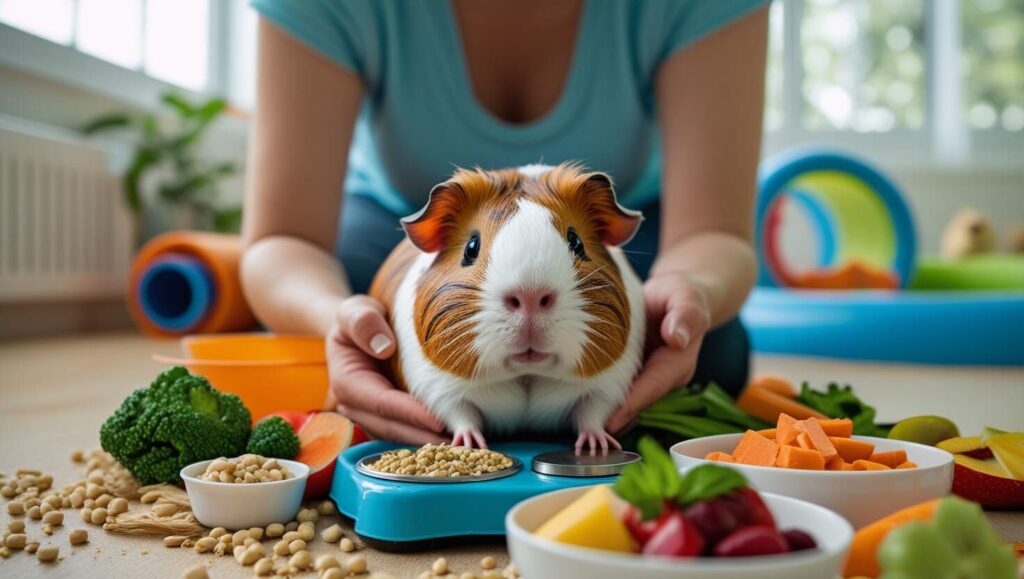
Explore Our Guide on Managing an Overweight Guinea Pig – Do’s and Don’ts for a Healthier Pet.
Helping Your Overweight Guinea Pig
Before making any changes, it’s essential to consult a veterinarian to check for any underlying health issues that might be contributing to your guinea pig’s weight gain. A vet can provide treatment recommendations and guide you on the best approach to help your pet lose weight safely.
Ways to Help Your Guinea Pig Lose Weight:
- Follow proper portion sizes and avoid overfeeding.
- Reduce fruit intake to limit excess sugar.
- Cut out unhealthy treats and processed snacks.
- Encourage daily exercise with regular floor time.
- Use a spacious cage to promote natural movement.
- Introduce chew toys and enrichment activities to keep them engaged.
- Incorporate food-hiding techniques to make them work for their meals.
By making gradual adjustments and keeping their diet balanced, you can help your guinea pig achieve a healthy weight while ensuring they stay active and happy! 🐹✨
Tips to Avoid Your Guinea Pig Becoming Overweight
Maintaining a healthy weight is essential for your guinea pig’s overall well-being. A balanced diet consisting of fresh vegetables, high-quality pellets, and unlimited hay helps manage their nutritional intake while ensuring they stay active and fit. Encouraging movement and exercise through a large play area or playpen allows them to explore and burn energy. Regular free-roaming time, interactive toys, and engaging play are key to preventing weight gain.
Monitoring their food portions and making dietary adjustments as needed helps prevent overfeeding. It’s important to avoid high-calorie foods and treats that are sugary or low in fiber, as these can contribute to unwanted weight gain.
Tips to Keep Your Guinea Pig at a Healthy Weight:
- Provide unlimited fresh hay to support digestion and regulate weight.
- Use a large playpen or open space for daily exercise.
- Encourage interactive play with toys and free-roaming time.
- Adjust portion sizes based on weight changes.
- Avoid high-calorie or sugary foods that contribute to obesity.
- Monitor weight regularly to catch early signs of unhealthy weight gain.
By following these simple steps, you can keep your guinea pig fit, energetic, and healthy while preventing weight-related issues! 🐹✨
Is 3 lbs Too Heavy for a Guinea Pig?
A guinea pig weighing 3 lbs or more may be considered overweight, depending on their size, breed, and overall health. The typical weight range for most guinea pigs falls between 1.5 to 2.5 lbs, so anything beyond 3 lbs could suggest obesity or underlying health concerns.
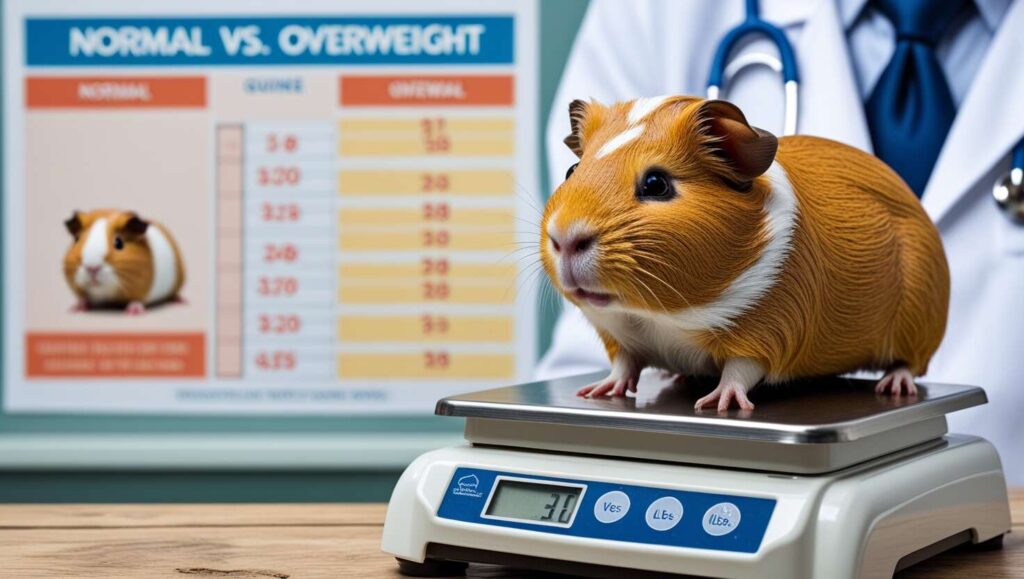
A rapid weight gain of over 150 grams should be monitored closely, as excessive weight can lead to health complications. While some larger breeds may naturally be on the heavier side, a guinea pig reaching 10 lbs would be highly abnormal and require immediate veterinary attention.
When to Be Concerned About Your Guinea Pig’s Weight:
- Normal weight range: 1.5 to 2.5 lbs.
- Potential overweight: 3 lbs or more.
- Concerning rapid weight gain: Over 150 grams in a short period.
- Extreme concern: 10 lbs—seek urgent vet care.
If your guinea pig’s weight is outside the normal range, consult a veterinarian to assess their health, diet, and lifestyle for necessary adjustments. 🐹✨
